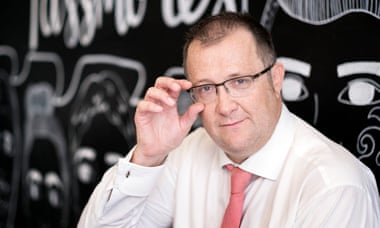Pronouns, Toilets and Uniforms: How Schools Became the Front Lines of the Gender War | Education
Ⅴic Goddard, principal of Passmore Secondary School in Essex, doesn’t want to get into the culture wars. Instead, he plotted a way to meet his £320,000 deficit over the summer from rising utility bills and rising teacher salaries across the country, but had no additional cash to pay for it.
“Why do politicians have an opinion on my school toilets? On our unity policy?” he said. “Sort out skyrocketing electricity bills and cost of living. Don’t get involved in small decisions that don’t add value.”
Goddard notes what many schools, both above and below the country, refer to as the apparent politicization of the increasingly inflammatory issues they are forced to deal with on a regular basis. it’s gender. Everything from toilets (sex and unisex), uniforms (skirts, trousers) to reading materials and student pronouns are the subject of hostile debate, the principal said.
In Goddard’s case, the school had to resolve issues such as pronoun changes as well as the inability of gender-questioning students to comfortably use the same gender-segregated changing rooms. It’s a relatively new school, so it’s more flexible than a school in a 50-year-old building. “You can offer a compromise and say, ‘Please change here instead,'” Goddard explained. “Problem solved.” His point is that these problems have traditionally been resolved quietly between principals, parents and students, without interference from outsiders who have no interest in the school. It means that

The government’s Attorney General, Suella Braverman, joined a debate this summer about how schools should address gender issues. Earlier this month, Conservative MPs said in a speech at the think tank’s Policy Exchange that schools have no legal obligation to comply with student gender choices, requiring transgender children to wear uniforms, use the bathroom, and so on. Schools that have sparked controversy by saying they can refuse to do so are breaking the law by no longer providing separate toilets for boys and girls.
According to a former Department of Education (DfE) official, this is nothing new under the current administration, but some allegations are in danger of taking over more pressing issues for schools. An insider who worked in the department during his tenure at the time said, “There was a sense throughout the Cabinet and also from number 10 that we needed to raise the profile of this issue.” There was no evidence of that.”
Advisors said that all the evidence they saw in the department indicated that transgender issues were a concern for the school, but apart from “small isolated situations” where there were serious problems, the school was not “others.” “We’re dealing with it ourselves, just like any other problem,” he said. “There is no crisis,” the source added.
Goddard’s experience bears this out. His school has had unisex restrooms for several years, he says, which is better than conventional restrooms that can encourage bullying. “Our old toilet was an enclosed space and there were no adults in it. Students said they felt isolated and didn’t know who was there. of unisex toilets feel safe.”

Students have come up with their own solutions to protect their privacy. Boys come in and turn right, girls turn left. The girl was worried that the boy would put the camera phone under the door, so the door doesn’t have a gap to allow that.
Goddard said it was put in place before it became common for right-wing media to expose schools as being too “awoke.” In the “far left to far right” community, some parents inevitably had strong opinions. “But it’s about listening and being ready to compromise,” he said.
Braverman’s comments sparked a storm of approval and outrage on Twitter.The mother of a child born as a girl has chosen to be treated as “them/them” for the past year and tweeted that she was “boiling with rage.” Observer “This is fear and hate-mongering. The fact that governments are deliberately terrorizing children and young people is disgusting.” ”
Her child was upset that two boys were deliberately using the wrong names at school. “If the government were to make this law, some children would feel small and entitled to call themselves whatever they wanted.”
But a second mother, fearing her teenage daughter wanted to be a boy, was “overjoyed” to hear that Braverman was “trying to set clear rules.” Removed, her remarks are very sound,” she added.
Some education lawyers have disputed the legality of Braverman’s comments, arguing that her advice could expose schools to allegations of discrimination. Legal director Esther Maxwell, who advises schools on transgender issues, says the law in this area is complicated and Braverman doesn’t really disclose the school’s situation.
“There are some question marks about some of the comments she made and our interpretation of the Equality Act,” she said. It’s hard to think of what the legitimate purpose of mixed schools with
In addition to attracting the attention of politicians, individual schools are increasingly being scrutinized in the media for policies they perceive to be related to gender issues.
Several schools have faced outrage from parents after announcing they would be trouser-only gender-neutral uniforms from September. I’m here. Telegraph revealed that starting in September, schools will “skirt off” and all students will wear trousers or shorts. The school’s principal, Sammy Crook, told the newspaper that not only did he want the uniform to be “more gender neutral”, but that trying to enforce the school’s skirt length policy had become “frustrating” and “time consuming”. .
The newspaper reported that many parents opposed the change. Frankie Ruffolo criticized the move on Twitter.He said Observer: “Schools need to be careful not to pander to minorities or put ideas in children’s heads,” says parents who care more about the hole in the school roof than the look of their uniforms. Added.
But another parent said he was “surprised” that the one-size-fits-all policy had sparked so much controversy, accusing people of jumping on the “right-wing bandwagon.”
“This decision has nothing to do with waking up,” he said. “Skirts are getting shorter and shorter and are banned because they violate the dress code.”
Other schools that have switched to trousers only also cite girls’ disrespect for skirt length rules as the main reason.
“It seems quaint to say that as a woman you have to wear a skirt,” said Jackie Ferris, senior assistant head at Dukeley’s Secondary School in Nottinghamshire. We plan to explore the possibility of introducing shorts to students of Girls can already choose to wear skirts or pants.
she said: It’s about equality. ”
At her school, girls often questioned gender identity more often than boys, and instead of being pulled into one of the two camps prevalent on Twitter, they treated every child as an individual. She explained that she tried to handle it.
“Sometimes it’s girls who reject all that’s been attacked about what women should look like,” she said. We’re trying to create an environment that’s non-judgmental, with no intention or pressure on children who question their gender to follow any particular path.”

On TV shows such as Netflix’s hit Youth Romance heart stopperOne of the leading teens is transgender, which attracts a large audience, and school is not the only place young people learn about these issues.
However, the Teachers for Evidence-Based Education Group, a group of 10 teachers from elementary and middle schools across the country, found that some schools have different views on gender, despite the lack of scientific consensus yet. are presented to children as if they were facts.
a member of the group who spoke with Observer The teacher, who spoke on condition of anonymity, said she was sometimes afraid to speak out in case she was accused of transphobia.
A London secondary school teacher said: However, teachers do not always feel that they can raise concerns with the protective lead. ”
The group is also concerned that some schools have not adhered to the usual rules of parental involvement when it comes to identity issues.

“Teachers call home for any minor concern, but in some schools, children who question their identity are treated as if they have privacy from their parents,” she said. Told.
Rebecca Newton (not her real name) said her 13-year-old daughter, who had been bullied at school for being gay, said she was a boy two weeks after being presented at school by a transgender adult. I said I think
“This presentation was inappropriate for a 13-year-old girl who was preoccupied with her body and other issues,” Newton said. “It was a secret from her parents. If I had known about it, I would have discussed these issues with her.”
A few months later, the school began sending correspondence home mentioning a boy’s name that Newton’s son did not know was being used at school. “They didn’t ask us about this. A form has to be signed for a child to go on a theater trip or be given paracetamol, but this was done without discussing it with me.” she said.
School and College Leaders Union General Secretary Jeff Burton said the DfE has not consulted schools or issued guidance on these issues. .
“For years, the school has independently navigated this difficult area and made decisions that serve the best interests of all students.”
A DfE spokeswoman declined to comment on allegations that the government is politicizing transgender issues in schools. However, she said:
“This is a complex area of law and a sensitive issue that schools manage,” she said, adding that the department is developing guidance to help schools feel more confident in making decisions. rice field.













